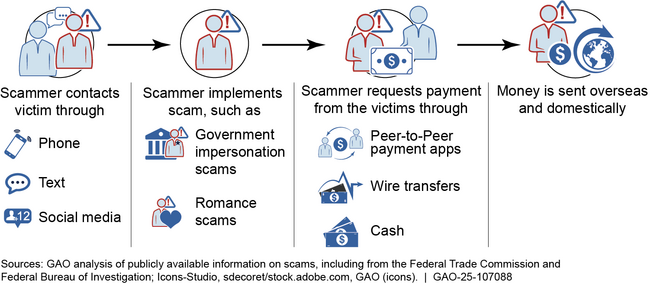Consumer Protection: Actions Needed to Improve Complaint Reporting, Consumer Education, and Federal Coordination to Counter Scams
Fast Facts
Scammers manipulate victims into sending them money. These scams may be costing Americans billions of dollars annually.
For example, based on banking data filed in 2021, Treasury estimated $200 billion in impersonation-related suspicious activity. That's when a scammer impersonates someone else—like a potential romantic partner or employer, or a customer service representative—to get money.
There is no government-wide estimate of the money lost to scams, no common definition of scams, and no national strategy for combating them. Having these could help federal agencies protect consumers.
We recommended addressing this and more.

Highlights
What GAO Found
Scams occur in a variety of forms, have evolved with technology, and are a growing risk to consumers. Commonly, scams involve a scammer contacting the victim, engaging the victim with a particular type of scam, and requesting a payment for a false purpose.
Examples of a Scam Execution Process

Note: Other types of contact methods, scams, and payment methods exist.
The 13 federal agencies GAO spoke with engage in a range of efforts to counter scams. However, none were aware of a government-wide strategy to guide those efforts. Existing strategies did not focus on countering scams and did not apply across agencies. The Federal Bureau of Investigation (FBI) is developing a cyber-enabled fraud strategy. The overlap in issues relating to scams and cyber-enabled fraud could provide FBI with the expertise to develop a government-wide strategy. Developing a government-wide strategy would better position agencies to coordinate and strategically target their efforts to counter scams.
The Consumer Financial Protection Bureau (CFPB), FBI, and Federal Trade Commission (FTC) receive, compile, and report on consumer complaints pertaining to issues including internet-related crime and scams. Data limitations, such as issues with how data are collected, do not allow agencies to calculate the exact number of scam complaints, but each agency can estimate the number it receives. For example, the FBI estimated that in 2023 it received approximately 589,400 scam-related complaints, resulting in losses of $10.55 billion. In addition, no government-wide estimate of the total number of scams and dollar losses exists. Improved data collection and estimates would better support federal efforts to understand the extent of this type of crime and develop ways to counter it.
CFPB, FBI, and FTC provide a variety of education resources for consumers. However, they do not measure the effectiveness of their education efforts on the consumers that receive them. Doing so would help the agencies understand how their education efforts are affecting consumers' ability to recognize and protect themselves from scams and how the agencies might adjust their education materials to best help consumers.
Why GAO Did This Study
Scams, a method of committing fraud, involve the use of deception or manipulation intended to achieve financial gain. Scams often cause individual victims to lose large sums—in some cases their entire life savings.
GAO was asked to review federal agencies' and businesses' efforts to counter scams. This report examines, among other things, the extent to which (1) a comprehensive, government-wide strategy guides agency efforts; (2) selected federal agencies compile scam-related complaint data and agencies' ability to estimate the total number of scams and related dollar losses; and (3) selected agencies measure the effectiveness of consumer education activities.
GAO analyzed publicly available information, agency documents, and agency consumer complaint data. GAO interviewed agency officials and representatives of relevant industries and advocacy groups.
Recommendations
GAO is making 16 recommendations to various agencies to develop a government-wide strategy to counter scams, a national scam estimate, a common definition of scams, and evaluate the outcomes of consumer education efforts. The FBI disagreed with three recommendations related to the development of a national estimate, a definition of scams, and evaluating the outcomes of its consumer education efforts. GAO maintains the recommendations are valid, as discussed in the report. FTC neither agreed nor disagreed with the five recommendations made to it.
Recommendations for Executive Action
| Agency Affected | Recommendation | Status |
|---|---|---|
| Federal Bureau of Investigation | The Director of FBI should lead a U.S. government effort to develop and implement a government-wide strategy to counter scams and coordinate related activities. This effort should be done in collaboration with the Director of CFPB, the Chair of FTC, the Secretary of the Treasury, and other agencies, as appropriate (through their designees). This effort should address issues such as a common definition for scams; consumer complaint reporting; related types/granularity/aggregation of data, risks, and responses; a government-wide estimate of this type of crime; and coordination of federal and business activities. As appropriate, and consistent with desired characteristics, a strategy should also define agency roles, responsibilities, and authorities; identify necessary resources; and identify any legislative, regulatory, or administrative changes needed to enable a comprehensive, coordinated response. (Recommendation 1) |
When we confirm what actions the agency has taken in response to this recommendation, we will provide updated information.
|
| Federal Trade Commission | The Chair of FTC should, in collaboration with CFPB, FBI, and other major contributors, explore ways to harmonize data collection and contributions to Sentinel to better identify scams, such as consistently collecting data on scam type, dollar loss amount, payment method, and other data fields, as appropriate. (Recommendation 2) |
When we confirm what actions the agency has taken in response to this recommendation, we will provide updated information.
|
| Consumer Financial Protection Bureau | The Director of CFPB should, in collaboration with FTC, explore ways to harmonize data collection to better identify scams, such as consistently collecting data on scam type, dollar loss amount, payment method, and other data fields, as appropriate. (Recommendation 3) |
When we confirm what actions the agency has taken in response to this recommendation, we will provide updated information.
|
| Federal Bureau of Investigation | The Director of FBI should, in collaboration with FTC, explore ways to harmonize data collection to better identify scams, such as consistently collecting data on scam type. (Recommendation 4) |
When we confirm what actions the agency has taken in response to this recommendation, we will provide updated information.
|
| Consumer Financial Protection Bureau | The Director of CFPB should use the agency's data collection and analysis to produce and report an estimate of the number of complaints it receives and the associated financial losses resulting from scams. (Recommendation 5) |
When we confirm what actions the agency has taken in response to this recommendation, we will provide updated information.
|
| Federal Bureau of Investigation | The Director of FBI should use the agency's data collection and analysis to produce and report an estimate of the number of complaints it receives and the associated financial losses resulting from scams. (Recommendation 6) |
When we confirm what actions the agency has taken in response to this recommendation, we will provide updated information.
|
| Federal Trade Commission | The Chair of FTC should use the agency's data collection and analysis to produce and report an estimate of the number of complaints it receives and the associated financial losses resulting from scams. (Recommendation 7) |
When we confirm what actions the agency has taken in response to this recommendation, we will provide updated information.
|
| Consumer Financial Protection Bureau | The Director of CFPB should, in collaboration with FBI, FTC, and other agencies, as appropriate, develop and report a single, government-wide estimate of the number of consumers affected by, and dollar losses resulting from, scams, factoring in an estimate of incidents not reported. (Recommendation 8) |
When we confirm what actions the agency has taken in response to this recommendation, we will provide updated information.
|
| Federal Bureau of Investigation | The Director of FBI should, in collaboration with CFPB, FTC, and other agencies, as appropriate, develop and report a single, government-wide estimate of the number of consumers affected by, and dollar losses resulting from, scams, factoring in an estimate of incidents not reported. (Recommendation 9) |
When we confirm what actions the agency has taken in response to this recommendation, we will provide updated information.
|
| Federal Trade Commission | The Chair of FTC should, in collaboration with CFPB, FBI, and other agencies, as appropriate, develop and report a single, government-wide estimate of the number of consumers affected by, and dollar losses resulting from, scams, factoring in an estimate of incidents not reported. (Recommendation 10) |
When we confirm what actions the agency has taken in response to this recommendation, we will provide updated information.
|
| Consumer Financial Protection Bureau | The Director of CFPB, prior to developing a single estimate of the number of consumers affected by, and dollar losses resulting from, scams, should adopt the definition of scams developed by the Federal Reserve or work with FBI and FTC and other affected agencies to develop and adopt a common definition of scams and related scam types. (Recommendation 11) |
When we confirm what actions the agency has taken in response to this recommendation, we will provide updated information.
|
| Federal Bureau of Investigation | The Director of FBI, prior to developing a single estimate of the number of consumers affected by, and dollar losses resulting from, scams, should adopt the definition of scams developed by the Federal Reserve or work with CFPB and FTC and other affected agencies to develop a common definition of scams and related scam types. (Recommendation 12) |
When we confirm what actions the agency has taken in response to this recommendation, we will provide updated information.
|
| Federal Trade Commission | The Chair of FTC, prior to developing a single estimate of the number of consumers affected by, and dollar losses resulting from, scams, should adopt the definition of scams developed by the Federal Reserve or work with CFPB and FBI and other affected agencies to develop a common definition of scams and related scam types. (Recommendation 13) |
When we confirm what actions the agency has taken in response to this recommendation, we will provide updated information.
|
| Consumer Financial Protection Bureau | The Director of CFPB should establish metrics and a plan to measure the effectiveness of its antiscam training on the stakeholder organizations and consumers that receive it through in-person events or webinars. This could include understanding the training's effect on consumers' ability to recognize and protect themselves from scams. (Recommendation 14) |
When we confirm what actions the agency has taken in response to this recommendation, we will provide updated information.
|
| Federal Bureau of Investigation | The Director of FBI should establish metrics and a plan to measure the effectiveness of its antiscam training on the consumers that receive it through in-person events or webinars. This could include understanding the training's effect on consumers' ability to recognize and protect themselves from scams. (Recommendation 15) |
When we confirm what actions the agency has taken in response to this recommendation, we will provide updated information.
|
| Federal Trade Commission | The Chair of FTC should establish metrics and a plan to measure the effectiveness of its antiscam training on the consumers that receive it through in-person events or webinars. This could include understanding the training's effect on consumers' ability to recognize and protect themselves from scams. (Recommendation 16) |
When we confirm what actions the agency has taken in response to this recommendation, we will provide updated information.
|
